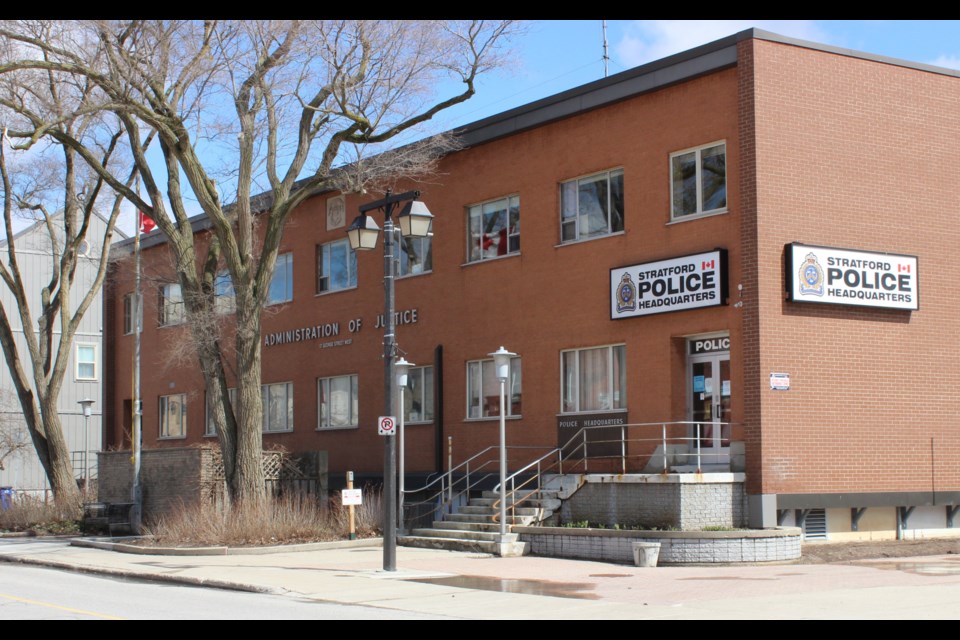Working on the front lines as a police officer is a tough assignment at the best of times.
During the pandemic, Stratford Police Service were challenged with call increases in categories Stratford Police Service chief Greg Skinner called the big five: mental health, addiction, homelessness, self-harm and family conflict.
All are intertwined, complex, social issues that have been exasperated by the pandemic.
“It really challenged our resources and our existing partnerships – to be more collaborative, to brainstorm more solutions to these issues rather than view them as potentially a law enforcement issue or a social services issue,” said chief Skinner.
At the outset of the pandemic, Stratford police used an ‘after action report’ borrowed from Toronto Police Service, based on SARS experiences. The initial phase of police response locally – inclusive of St. Marys and Perth South, communities covered by Stratford police, included recommendations about deployment, visibility and reassurance to the public, partnering with stakeholders, primarily public health and hospital and social services.
No one expected the pandemic to go on for two-plus years, though, he said.
Skinner became Chief of Police in 2018 after 31 years with Ontario Provincial Police. Stratford Police Service has 67 sworn police officers of all ranks, from chief to constable and 21 civilians including special constables, prisoner transport, administration and 12 communication operators/dispatchers.
“You know at the end of the day, it’s still a people business. Still about how to talk to people, support them, help find solutions. From that aspect, policing hasn’t changed. But the things police officers deal with on the street today are hugely more complex than what I faced when I was a young constable.”
In those days, it was break and enters, assaults and traffic collisions. Today, mental health and addiction have increased and the ways police approach situations are different, he said.
For several years now, Stratford police have teamed up with mental health professionals working for Huron Perth Healthcare Alliance as part of the Mobile Crisis Rapid Response Team (MCRRT).
Police officers showing up in a marked cruiser can sometimes have an aggravating impact on someone in a mental health crisis, chief Skinner said. Having a person arrive with subject matter expertise can be beneficial.
“The mental health professionals have been a Godsend,” he said.
Deborah Wiseman, VP partnerships and chief nursing executive at HPHA, said the program started with just one mental health professional. There are now 5.5 full-time equivalent employees partnering with local police to help residents in crisis.
“It is an incredibly successful program in supporting mental health calls,” she said.
The MCRRT team responds after police have arrived and ensured safety at the scene.
The HPHA team are often social workers or registered nurses and have gone through orientation and crisis training. They are able to provide face-to-face engagement, help with de-escalation and can get a better understanding of the situation. Some in the community are apprehensive about police interaction or have struggled with first contacts in the healthcare system, so the team approach helps.
The partnership has allowed police and mental health workers to grow and develop in their awareness of their communities and get a better understanding of available resources.
Statistics help explain the need. In 2020, police responded to 320 calls with MCRRT workers. In 2021, they responded to 1,200 calls. Calls include people in crisis at the time but also follow-ups, which can be just as important as helping individuals and their loved ones. Adding more staff and getting to more calls is part of the reason for the increase, but so is the stress of living through a pandemic, chief Skinner said.
“We get a lot of calls from families who are at their wit’s end. They are frustrated, afraid, out of their depth of knowledge and looking for someone to talk to and get some guidance.”
Mental health workers get enhanced training up front, Wiseman said. Over the past year, calls have increased for suicidal ideation, trauma and bereavement. Coverage is set to expand in the areas the team covers, which includes Huron County. Weekday daytime shifts and every other weekend will be bumped to 8 a.m. to 11 p.m. weekdays and 12-hour weekend shifts. With a big geographic area to cover and staff rotating through, communities get coverage about every third week.
Andrew Williams, president and CEO of the HPHA, said the partnership brings care right to the front lines where people need it.
“I think in the next five years, in our healthcare system, what we have to do better is bring care to people and support their overall health and wellness. As clients become more comfortable with it, we will see further benefits as people get more trusting and relationships develop. A lot of this is relationships, it will bring more value to the community and individuals specifically.”
Chief Skinner said police have worked closely with leadership at HPHA to ensure the program is effective.
“Mental health concerns are a growth area in our community,” chief Skinner said. “It doesn’t matter if you are a grade school student or a senior citizen – it is across the board and people need support and guidance to navigate the system because it is a complex system to navigate.”



